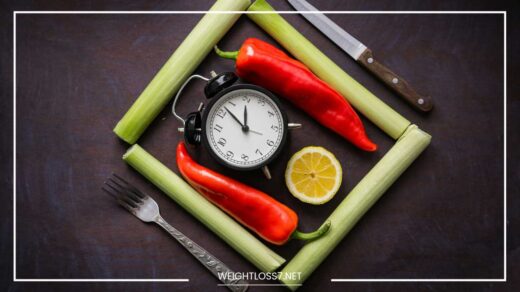How to Lose Weight Without Exercise

Weight Loss
Losing weight without exercise is a goal shared by many individuals looking to improve their health and enhance their overall well-being.
While exercise is often considered a crucial component of weight loss, there are effective strategies that can help you shed those extra pounds without engaging in strenuous physical activities.
In this comprehensive guide, we will explore various methods and lifestyle changes that can aid in weight loss without relying solely on exercise.
Understanding Weight Loss: Calorie Deficit and Metabolism
Before delving into the strategies for losing weight without exercise, it’s important to understand the fundamentals of weight loss.
The key principle is creating a calorie deficit, where you consume fewer calories than your body burns.
This deficit forces your body to utilize stored fat for energy, resulting in weight loss. Additionally, metabolism plays a crucial role in how efficiently your body burns calories.
Metabolism is the process by which your body converts the food you eat into energy. It encompasses all the chemical reactions that sustain life, including the burning of calories for energy.
Your basal metabolic rate (BMR) represents the number of calories your body needs to perform basic functions at rest, such as breathing, maintaining body temperature, and circulating blood.
By understanding the relationship between calorie intake, calorie expenditure, and metabolism, you can develop an effective weight loss plan.
Mindful Eating: Portion Control and Healthy Food Choices
One effective strategy for weight loss is mindful eating. Mindful eating is the practice of being fully present and aware of the food you eat and the act of eating.
By paying close attention to your eating habits and making intentional choices, you can reduce calorie intake without feeling deprived. Here are some mindful eating tips:
- Portion Control: Be conscious of portion sizes and serve yourself appropriate amounts. Use smaller plates and bowls to trick your mind into feeling satisfied with less food.
- Eat Slowly: Chew your food thoroughly and savor each bite. Eating slowly gives your body time to signal when it’s full, preventing overeating.
- Listen to Your Body: Pay attention to hunger and fullness cues. Eat when you’re hungry and stop when you’re satisfied.
- Avoid Distractions: Avoid eating while watching TV, working, or using electronic devices. Focus solely on your meal to prevent mindless eating.
- Choose Nutrient-Dense Foods: Opt for whole, nutrient-dense foods such as fruits, vegetables, lean proteins, and whole grains. These foods provide essential nutrients while keeping you full and satisfied.
- Limit Processed Foods: Minimize the consumption of processed and high-calorie foods, such as sugary snacks and drinks, which can lead to weight gain.
- Stay Hydrated: Drink water before and during meals to help control hunger and prevent overeating.
Optimal Hydration: Drinking Water for Weight Management
Staying properly hydrated is not only essential for overall health but can also aid in weight loss. Drinking water before meals can help reduce appetite and prevent overeating.
Additionally, water boosts your metabolism and aids in digestion, ensuring your body efficiently processes nutrients.
A study published in the journal “Obesity” found that drinking 16 ounces (500 ml) of water before meals led to greater weight loss than a control group that did not pre-load with water.
Participants who drank water before meals lost an average of 2.87 pounds (1.3 kg) more over a 12-week period.
Quality Sleep: The Role of Rest in Weight Loss
Sleep plays a significant role in weight management. Lack of sleep disrupts hormone levels, including those that regulate appetite, leading to increased cravings and potential weight gain.
Additionally, poor sleep can negatively affect your mood and energy levels, making it challenging to stay motivated to make healthy choices.
Several hormones related to appetite and metabolism are influenced by sleep duration and quality.
Leptin, a hormone that suppresses appetite, decreases with inadequate sleep, while ghrelin, a hormone that stimulates hunger, increases. This hormonal imbalance can lead to overeating and weight gain.
Aim for 7-8 hours of quality sleep each night to support your weight loss efforts.
Create a bedtime routine that promotes relaxation and improves sleep quality, such as dimming the lights, avoiding electronic devices before bed, and establishing a consistent sleep schedule.
Stress Management: Controlling Cortisol Levels
Chronic stress can hinder weight loss progress by increasing the production of cortisol, a hormone associated with weight gain, especially around the abdominal area.
Cortisol is released in response to stress, and high levels can lead to increased appetite and cravings for unhealthy, high-calorie foods.
To manage stress effectively:
- Practice Mindfulness: Engage in mindfulness practices such as meditation, deep breathing exercises, or yoga to reduce stress levels.
- Engage in Physical Activity: While this guide focuses on weight loss without exercise, engaging in non-strenuous physical activities like walking or gardening can reduce stress.
- Get Adequate Sleep: Prioritize quality sleep to help regulate cortisol levels and manage stress.
- Identify Stress Triggers: Identify sources of stress in your life and develop coping strategies to deal with them more effectively.
- Take Breaks: Incorporate breaks and relaxation periods throughout your day to recharge and reduce stress.
Intermittent Fasting: Restricting Eating Windows
Intermittent fasting has gained popularity as an effective weight loss strategy. This eating pattern involves alternating periods of fasting and eating.
By restricting your eating window, such as following the 16/8 method (fasting for 16 hours and eating within an 8-hour window), you can promote weight loss and improve metabolic health.
Intermittent fasting works by extending the period of time your body spends in a fasted state.
During fasting periods, your insulin levels drop, allowing your body to access stored fat for energy. Additionally, intermittent fasting can lead to a reduction in overall calorie intake, further supporting weight loss efforts.
Research has shown that intermittent fasting can be an effective tool for weight loss and may also provide other health benefits, such as improved blood sugar levels and enhanced brain health.
However, it’s essential to approach intermittent fasting with caution and consult with a healthcare professional, especially if you have any underlying health conditions or concerns.
Healthy Snacking: Nutritious Options to Curb Hunger
Choosing healthy snacks can help you control hunger and reduce calorie intake throughout the day. Snacking on nutrient-dense foods that provide essential nutrients can keep you satisfied between meals. Here are some nutritious snack options:
- Nuts and Seeds: Almonds, walnuts, chia seeds, and flaxseeds are rich in healthy fats, protein, and fiber, which help keep you full.
- Greek Yogurt: High in protein and probiotics, Greek yogurt can promote satiety and support gut health.
- Fruits and Vegetables: Snack on fresh fruits and vegetables, such as apples, carrots, or bell peppers, for a low-calorie, nutrient-rich option.
- Hard-Boiled Eggs: Eggs are a good source of protein and healthy fats, making them a satisfying and portable snack.
- Hummus and Veggie Sticks: Pairing hummus with cucumber, celery, or carrot sticks provides a balanced and tasty snack.
- Whole-Grain Crackers: Opt for whole-grain crackers, which contain fiber and complex carbohydrates for sustained energy.
Remember to practice portion control when snacking, as even healthy snacks can contribute to weight gain if consumed in large quantities.
Fiber-Rich Diet: Benefits for Weight Loss
Incorporating fiber-rich foods into your diet offers several benefits for weight loss.
Fiber is a type of carbohydrate that the body cannot digest, so it passes through the digestive system without adding calories. High-fiber foods promote feelings of fullness, reduce cravings, and improve digestion.
There are two types of dietary fiber:
- Soluble Fiber: Dissolves in water and forms a gel-like substance in the digestive tract, slowing down digestion and promoting feelings of fullness. Foods high in soluble fiber include oats, beans, lentils, and certain fruits and vegetables.
- Insoluble Fiber: Does not dissolve in water and adds bulk to stools, promoting regular bowel movements. Foods high in insoluble fiber include whole grains, nuts, and many vegetables.
Fiber-rich foods are generally low in calories and provide essential nutrients, making them an excellent addition to your weight loss diet.
Aim to include a variety of fruits, vegetables, whole grains, and legumes in your meals to increase your fiber intake.
Portion Size Awareness: Trick Your Mind into Eating Less
Our perception of portion sizes can often be distorted, leading to overeating.
Portion control is essential for managing calorie intake and achieving weight loss goals. Here are some strategies to help you trick your mind into eating smaller portions:
- Use Smaller Plates and Bowls: Serving food on smaller plates and bowls can make your portions appear larger, tricking your mind into feeling satisfied with less food.
- Pre-Plate Your Meals: Avoid eating directly from a large container, such as a bag of chips or a carton of ice cream. Instead, pre-plate your meals and snacks to have better control over portion sizes.
- Mindful Eating: Eat slowly and pay attention to the taste and texture of your food. Savor each bite, allowing your body time to signal when it’s full.
- Pause Before Seconds: After finishing your first serving, wait a few minutes before considering seconds. This pause gives your body time to recognize whether you’re truly hungry for more food.
- Store Leftovers Immediately: If you’re cooking a meal at home, portion out your serving and store the leftovers in the refrigerator before eating. Having easy access to seconds can lead to mindless overeating.
By becoming more aware of portion sizes and adopting these portion control strategies, you can train your mind to feel satisfied with smaller amounts of food, ultimately supporting your weight loss efforts.
Meal Planning and Preparing: Stay on Track with Your Goals
Meal planning and preparation can significantly contribute to weight loss success. By planning your meals ahead of time and preparing healthy options, you can avoid impulsive food choices and stay on track with your goals.
Here are some meal planning and preparation tips:
- Set Aside Dedicated Time: Set aside time each week to plan your meals and create a shopping list. This will help you stay organized and ensure you have all the ingredients you need on hand.
- Choose Balanced Meals: Aim for balanced meals that include a mix of protein, healthy fats, fiber-rich carbohydrates, and vegetables. Balanced meals keep you full and satisfied for longer periods.
- Batch Cooking: Prepare larger quantities of certain meals and portion them into individual servings. This saves time and allows you to have healthy meals ready to eat throughout the week.
- Pack Your Lunch: If you work outside the home or are frequently on the go, pack your lunch and snacks to avoid relying on unhealthy options.
- Keep Healthy Snacks Handy: Have healthy snacks readily available, such as pre-cut fruits and vegetables or individual servings of nuts.
- Practice Food Safety: Store prepared meals properly to ensure food safety and prevent spoilage.
By planning and preparing your meals in advance, you can take control of your food choices and ensure they align with your weight loss objectives.
Mindset Shift: Positive Attitude and Self-Reflection
Adopting a positive attitude and engaging in self-reflection is crucial when embarking on a weight loss journey. Weight loss can be challenging, and setbacks are normal.
Instead of focusing on perfection, celebrate small victories, stay motivated, and be kind to yourself throughout the process.
Here are some tips to cultivate a positive mindset:
- Set Realistic Goals: Set achievable and realistic weight loss goals to avoid feeling overwhelmed or discouraged.
- Celebrate Progress: Celebrate every milestone, no matter how small. Acknowledge your achievements and use them as motivation to keep going.
- Practice Self-Compassion: Treat yourself with the same kindness and understanding that you would offer to a friend. Avoid self-criticism and negative self-talk.
- Visualize Success: Imagine yourself achieving your weight loss goals and visualize the positive impact on your life.
- Avoid Comparison: Focus on your progress and journey rather than comparing yourself to others. Everyone’s weight loss journey is unique.
- Seek Support: Share your weight loss goals with friends, family, or a support group. Surround yourself with people who encourage and support your efforts.
- Be Patient: Weight loss is a gradual process, and results may take time. Be patient with yourself and trust the process.
- Embrace Non-Scale Victories: Celebrate non-scale victories, such as increased energy, improved sleep, or better overall well-being.
By cultivating a positive attitude and practicing self-reflection, you can build resilience and maintain motivation throughout your weight loss journey.
Support System: Surrounding Yourself with Encouragement
Having a support system can make a significant difference in your weight loss journey. Surround yourself with friends, family, or online communities that share similar goals.
Seek encouragement, accountability, and advice from individuals who understand and support your aspirations.
Here are some ways to build a support system:
- Find an Accountability Partner: Partner with a friend or family member who also wants to lose weight. You can motivate and encourage each other on your journeys.
- Join Online Forums or Groups: Participate in online weight loss forums or social media groups where you can share experiences and receive support from like-minded individuals.
- Hire a Health Coach: Consider working with a health coach or nutritionist who can provide personalized guidance and support.
- Attend Weight Loss Meetings: If you prefer face-to-face interactions, consider attending weight loss support group meetings.
- Share Your Progress: Share your weight loss progress with your support system to celebrate achievements together.
Having a support system can help you stay accountable, provide fresh perspectives, and offer valuable tips and insights.
Slow and Steady Progress: Patience for Long-Term Results
Weight loss is a gradual process that requires patience and commitment. Avoid falling into the trap of seeking quick fixes or crash diets, as these approaches are often unsustainable and can lead to regaining lost weight. Instead, focus on making gradual and sustainable lifestyle changes.
Here are some tips for slow and steady weight loss progress:
- Focus on Behavior Changes: Concentrate on adopting healthy habits, such as mindful eating, regular sleep patterns, and stress management.
- Monitor Progress: Keep track of your weight loss journey through journaling, photos, or measurements.
- Be Consistent: Stay consistent with your healthy habits and avoid giving up after occasional setbacks.
- Avoid Drastic Caloric Restrictions: Extreme caloric restrictions can slow down your metabolism and lead to nutrient deficiencies.
- Celebrate Non-Scale Victories: Celebrate achievements beyond the number on the scale, such as improved energy levels or increased stamina.
By focusing on slow and steady progress, you can achieve long-lasting results and improve your overall well-being.
Incorporating Physical Activity: Non-Exercise Movement
While this guide primarily focuses on losing weight without exercise, incorporating non-exercise movement can support your weight loss efforts.
Non-exercise movement refers to activities that are not structured exercise sessions but contribute to daily calorie expenditure.
Here are some ways to incorporate non-exercise movement into your daily routine:
- Walk More: Choose to walk instead of drive whenever possible. Take short walking breaks during the day.
- Take the Stairs: Opt for stairs over elevators and escalators whenever available.
- Household Chores: Engage in household chores such as cleaning, gardening, or washing the car.
- Stand Up: Take breaks from sitting by standing up and stretching periodically.
- Dance: Put on your favorite music and dance around the house for a fun way to burn calories.
- Play with Pets: Engage in playtime with your pets to get moving and enjoy bonding time.
Every bit of movement counts toward your overall calorie expenditure and can contribute to weight loss.
Tracking Progress: Monitoring Weight Loss Journey
Tracking your progress is essential for staying motivated and making adjustments as needed. Keep a record of your food intake, monitor your weight, and take measurements periodically.
These measurements can help you understand your progress, identify areas for improvement, and provide valuable insights into your weight loss journey.
Here are some ways to track your weight loss progress:
- Food Journaling: Write down everything you eat and drink to become more aware of your eating habits.
- Weight Monitoring: Weigh yourself regularly, but avoid becoming fixated on daily fluctuations.
- Measurements: Measure your waist, hips, chest, and other areas to track changes in body composition.
- Photos: Take progress photos to visually see changes in your body over time.
- Fitness Apps: Use fitness apps or wearable devices to track daily steps, calorie intake, and physical activity.
Tracking your progress can help you stay on track with your weight loss goals and provide motivation to continue your efforts.
Final Thoughts
Losing weight without exercise is possible by implementing various strategies that promote a healthy lifestyle and support sustainable weight loss.
By adopting mindful eating practices, staying hydrated, managing stress, and incorporating intermittent fasting, you can achieve your weight loss goals.
Remember to be patient, stay motivated, and celebrate your progress along the way. Combining these strategies with non-exercise movement and tracking your progress will set you on the path to successful and long-lasting weight loss results.
Always consult with a healthcare professional or registered dietitian before starting any weight loss program, especially if you have underlying health conditions or concerns.
They can provide personalized guidance and ensure that your weight loss approach is safe and effective for your individual needs.
FAQs (Frequently Asked Questions)
Can I lose weight without exercising at all?
While exercise is beneficial for weight loss, implementing the strategies outlined in this article can help you lose weight without relying solely on exercise.
Is intermittent fasting suitable for everyone?
Intermittent fasting may not be suitable for individuals with certain medical conditions. It’s advisable to consult with a healthcare professional before adopting this eating pattern.
Can drinking water alone help me lose weight?
While drinking water is beneficial for weight management, it’s most effective when combined with a balanced diet and other lifestyle changes.
How can I manage stress effectively?
Engaging in relaxation techniques, such as meditation, deep breathing exercises, or yoga, can help manage stress levels effectively.
Is it normal to experience fluctuations in weight during the journey?
Yes, weight fluctuations are normal and can be influenced by various factors, including water retention, hormones, and food intake.

















